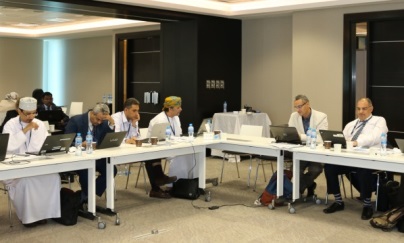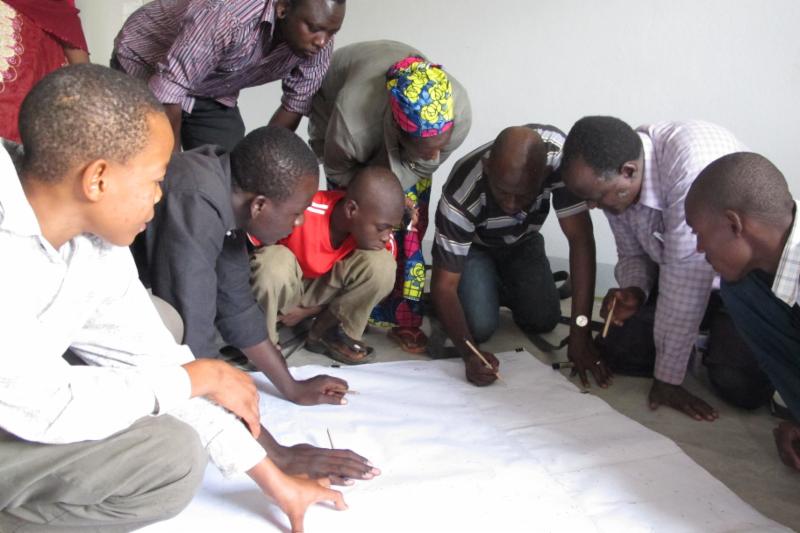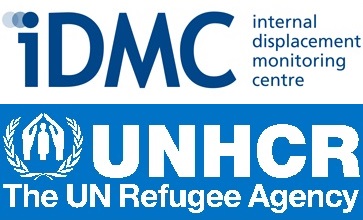|
| Welcome to the July edition of the UNFCCC Nairobi work programme (NWP) eUpdate |
| IN THIS EDITION Click on the headers on the left to move to that specific section |
|
|
- Key conclusions from the 42nd session of the SBSTA
- Informal brainstorming session on the organization of the 9th
NWP Focal Point Forum
- NWP activities and deliverables: NWP on the road to Paris and
beyond
|
|
|
- LAKI priority-setting workshop in the West Asian subregion
- Case studies on good practices and lessons learned on
adaptation planning processes
- Views from Parties and NWP partners: Experts from
Canada, Nepal, the USA, and Birdlife International |
|
|
- Key events convened by NWP partners - New NWP partners - Regional and thematic representation of NWP partners |
|
|
- Helvetas publication: "Yachaykusan: Lessons on climate change
from the Andes" - IPACC briefing notes: "Conflict-Sensitive Adaptation: Use Human
Rights to Build Social and Ecological Resilience" - UNHCR and IDMC knowledge resources on planned relocation
and global displacement in the context of climate change |
|
|
- Adaptation Committee's expert meeting to promote livelihoods
and economic diversification to build resilience in the context of
planning, prioritizing and implementing adaptation - The 2-year workplan of the Executive Committee on Loss and
Damage - Non-State Actor Zone on Climate Action (NAZCA) - Internship opportunities with the UNFCCC Adaptation Programme |
|

The
SBSTA 42 conclusions recognised that strengthening collaboration and linkages between the NWP, other relevant adaptation workstreams, and constituted bodies under the Convention is important to ensure that the provision of knowledge support under the NWP contributes to enhanced adaptation actions. The SBSTA also requested the secretariat to continue to explore ways to enhance the interactive nature of information exchange during the 9th NWP Focal Point Forum, to be organized in conjunction with SBSTA 43 (December 2015).
In addition, the SBSTA acknowledged contributions from Parties and NWP partners to the development of case studies on good practices and lessons learned in relation to adaptation planning processes addressing ecosystems, human settlements, water resources and health, and in relation to processes and structures for linking national and local adaptation planning.
|
Informal brainstorming session on the organization of the 9th NWP Focal Point Forum
Under the guidance of the SBSTA Chair, the informal event was co-facilitated by Mr. Juan Hoffmaister (Bolivia) and Ms. Beth Lavender (Canada).
Participants from Parties and NWP partners had an engaging discussion on the organization of the 9th Focal Point Forum to be held in conjunction with SBSTA 43 in Paris. Participants made suggestions relating to a number of aspects of the Forum, including the potential topics for discussion; potential experts, organizations, and Parties who could contribute to these topics; the timing and duration of the event; effective ways to engage participants; and means to best synthesize and disseminate Forum outcomes. Drawing from the interactive discussions, the secretariat is currently working on developing the focus and agenda for the Forum under the guidance of the SBSTA Chair.
|
| NWP activities and deliverables: NWP on the road to Paris and beyond
|
 NWP AS A KNOWLEDGE HUB NWP AS A KNOWLEDGE HUB
|
| Lima Adaptation Knowledge Initiative: The priority-setting workshop in the West Asian subregion held on 15-17 June 2015 in Abu Dhabi
 Following the implementation of the pilot initiative in the Andean subregion, the implementation of the
Lima Adaptation Knowledge Initiative (LAKI) for the
Gulf Cooperation Council (GCC) subregion was launched in early 2015. The LAKI is a collaborative initiative resulting from a
joint action pledge between the secretariat and
UNEP, aiming to identify, prioritize, and then catalyse responses to adaptation knowledge gaps in different subregions across a range of different sectors and areas of vulnerability.
The priority-setting workshop for the GCC subregion was held from 15 to 17 June in Abu Dhabi. Nineteen climate change adaptation experts from the GCC member states discussed a number of knowledge gaps, before prioritizing ten gaps relating to water resources, terrestrial and marine ecosystems, food security, health, and cross-cutting issues. Then, experts identified a set of possible response actions. As a next step, the secretariat,
in collaboration with the
UNEP West Asia Regional Office
,
and the subregional coordination entity,
AGEDI
, will catalyse actions in response to these priority knowledge gaps.
|
| Case Studies on Good Practices and Lessons Learned on Adaptation Planning Processes: A collaborative initiative with the AC and the LEG In response to the invitation issued by the secretariat, Parties and NWP partner organizations contributed a total of 170 case studies on lessons learned and good practices of national adaptation planning processes addressing ecosystems, water resources, human settlements, human health, and on linking national and local adaptation planning. A document highlighting the good practices and lessons learned from these case studies will be made available for SBSTA 43 in Paris. The case studies will also be made available online through a new user-friendly online portal to be launched prior to the COP in Paris. |
|
Views from Parties and NWP Partners: Key knowledge challenges in adaptation and the potential role of the NWP in addressing them
In order to effectively catalyse and disseminate information and knowledge to inform and support adaptation policies and practices, it is important to consider the knowledge and
lessons learned from those implementing adaptation on the ground. For this edition of the eUpdate, we approached the following experts from Canada, Nepal, the USA and NWP partner Birdlife International for their thoughts on the key adaptation knowledge challenges impacting their work, and on what the NWP could do to address these challenges:
- Erin Myers, Senior Programme Officer for Canada's Climate Change and Health Adaptation Programme for Northern First Nations and Inuit Communities (CCHAP) at Health Canada;
- Naresh Sharma, National Programme Manager for the Nepal Climate Change Support Programme (NCCSP);
- Catherine Marzin, Climate Team Lead, National Oceanic and Atmospheric Administration (NOAA) (NOAA) Office of National Marine Sanctuaries, Maria Brown, Superintendent, NOAA's Greater Farallones National Marine Sanctuary & Sara Hutto, Ocean Climate Specialist, NOAA Office of National Marine Sanctuaries;
- Edward Perry, Global Climate Change Policy Coordinator at Birdlife International.
|
Q1.
What do you consider to be the key knowledge challenges relating to your work on adaptation?
|
Erin Myers: Since 2008, CCHAP has funded over 80 community driven research projects supporting the link between traditional knowledge frameworks and academic sciences to find appropriate and relevant health adaptation strategies to meet the issues arising from a changing climate. Over the years, a consistent challenge that CCHAP has faced is the need to constantly remind various stakeholders, whether it be scientists, governments, NGOs, funding agencies, academics, policy makers, etc., that indigenous voices need to be at the table and actively engaged in the adaptation dialogue. Their voices need not only to be heard, but understood, respected and supported as a knowledge framework, rooted in resiliency, that will foster the development of appropriate health adaptation plans and strategies.
|
Naresh Sharma: Nepal was the first country to officially endorse a Local Adaptation Plan of Action (LAPA) as part of its
National Adaptation Programmes of Action (NAPA) framework. The aim of this bottom-up approach was to translate central-level climate adaptation plans into tangible projects on the ground, including input from vulnerable communities. However, some key knowledge challenges remain which hinder linking national and local planning:
- Limited knowledge and understanding by technical staff of climate change impacts, and a limited awareness of climate change and its consequences amongst local and national level stakeholders.
- Lack of adequate information and knowledge, such as vulnerability data, at the local level.
- Poor coordination between national and local level stakeholders, and from service providers to beneficiaries, results in knowledge gaps affecting project execution and delivery.
- Communicating the attribution of impacts and vulnerability to climate change in the local context is challenging. Climate change is often considered an environmental problem whereas vulnerability is considered a social problem.
|
| Catherine Marzin, Maria Brown and Sara Hutto: The Greater Farallones National Marine Sanctuary (GFNMS) in California is pioneering the use of adaptation planning in national marine sanctuaries in order to best respond to, plan, and manage the impacts of climate change within its boundaries. The biggest challenge we've faced thus far adapting to climate change was where to begin, or essentially, which process to follow. In partnership with the non-profit organization EcoAdapt, GFNMS applied climate-smart conservation principles and an adaptation planning process that best suited GFNMS' large spatial scale and varying habitats, species, and ecosystem services. Once a climate-smart adaptation process was designed, GFNMS focused on filling critical knowledge gaps through a series of workshops with expert scientists and management partners in the region. Key knowledge gaps were addressed by assessing the current state of resources in relation to climate and non-climate stressors, and thus how they respond to climate change, assessing observed and projected changes in the regional climate, and assessing the vulnerability and adaptive capacity of sanctuary resources to climate change impacts. Armed with this information, a working group of the GFNMS Advisory Council is now developing adaptive management recommendations based on the vulnerability assessment and future climate scenarios. |
Edward Perry: BirdLife International's
Global Climate Change Programme helps local communities use ecosystem-based approaches to adapt to climate change and supports governments to develop and implement policies that fully recognize the role and needs of ecosystems. One challenge to the effective implementation of ecosystem-based adaptation (EbA) is the lack of understanding of how climate change impacts species assemblages, ecological function, and the service provisions of different ecosystems in different regions, and what this means for the long term viability of various EbA measures. Another, perhaps greater challenge is the limited awareness and understanding of the role that healthy ecosystems can play in adaptation and how EbA can be operationalized in, for example, the energy, agriculture and water sectors. Addressing this knowledge gap is critical for scaling up EbA in a coherent, cross-sectoral manner.
|
Q2.
What do you believe the NWP, in its role as a global adaptation knowledge initiative, could do to address these key knowledge challenges?
|
Erin Myers: Indigenous peoples are some of the worlds most vulnerable due to their deep physical and spiritual connection to an environment that, in some cases, is rapidly changing and putting communities at serious risk. Health Canada's CCHAP has learned that in order for communities to adapt to climate change impacts, planning and implementation needs to come from the community, for the community. The
NWP has an excellent opportunity to support indigenous communities by taking and applying the lessons learned from the CCHAP and supporting community driven adaptation planning and implementation. Not only will it then be more sustainable and reduce harm, but it will allow communities to take ownership of these initiatives, increasing the likelihood of their success. More initiatives and support for programs like CCHAP are needed, and the NWP is on the right path by sharing information and asking questions of how to address the many challenges. Climate change impacts are very real and threatening, but by incorporating ideas and best practices from around the world, more appropriate adaptation strategies can be found to keep communities safe and healthy.
|
Naresh Sharma:
We believe that the regular activities and events organized under the NWP provide unique opportunities to address some of the challenges we face, including effectively disseminating of the local experiences and knowledge to the regional and international level.
Regular technical workshops and meetings have provided us significant support to build on the team's existing expertise. Country level workshops coordinated with national agencies would add value in enriching the knowledge of the local staff and teams engaged in climate change related activities. Additionally, the
compendium on methods and tools
and documents on good practices and lessons learned have been very helpful for us to learn from others experiences. We suggest they be maintained and regularly updated.
|
Catherine Marzin, Maria Brown and Sara Hutto: The
NWP can play a critical role in encouraging natural resource managers to take the necessary steps to develop climate adaptation plans and planning processes by:
- Showcasing the good practices from different adaptation planning processes, from around the world;
- Sharing climate vulnerability assessments in different areas;
- Encouraging partnerships and participation in regional climate change adaptation efforts;
- Bringing managers together with facilitators and professionals experienced in climate-smart conservation processes to help managers incorporate climate change adaptation into their planning processes.
|
Edward Perry: The
NWP provides a unique mechanism for facilitating knowledge exchange and collaboration among diverse stakeholders, and across different sectors.Through multi-stakeholder workshops, forums and dialogue, the NWP can help break down the barriers between different sectors and promote cross-sectoral coordination and uptake of EbA. The NWP could also compile, streamline and disseminate knowledge products, prioritizing the following areas:
- The impacts of climate change on ecosystem services;
- Information and best practices of cost-benefit analysis for EbA as well as alternative approaches that more comprehensively consider ecosystems;
- Best practices for integrating EbA into adaptation planning cross-sectorally;
- Measures to safeguard against maladaptive practices which undermine social and ecological resilience.
|
 NWP AS AN ENGAGEMENT TOOL NWP AS AN ENGAGEMENT TOOL
|
|
Key Events Convened by NWP Partners
|
 United Nations High Commissioner for Refugees (UNHCR):
Human Mobility in the Context of Climate Change and the Paris Agreement (3 June 2015)
United Nations High Commissioner for Refugees (UNHCR):
Human Mobility in the Context of Climate Change and the Paris Agreement (3 June 2015)
To read
UNHCR's full summary of the event, click
here. An additional set of resources and guidelines discussed during the event have been documented in the '
Knowledge Resources' section of this eUpdate.
|
 United Nations Environment Programme (UNEP):
United Nations Environment Programme (UNEP):
Adaptation Knowledge Day (6 June 2015)
Attended by approximately 70 participants,
UNEP's 6th annual Adaptation Knowledge Day consisted of 3 sessions. In the opening session, expert panellists and event participants discussed how adaptation sharing can be strengthened as part of the global agreement on climate change. The following session focused on existing adaptation knowledge initiatives, such as the LAKI. The final session was on the exchange on adaptation knowledge; what works and what doesn't.
For more information on the event, click
here.
|
 Conservation International:
Ecosystem-based Adaptation Knowledge Exchange (7 June 2015)
Conservation International:
Ecosystem-based Adaptation Knowledge Exchange (7 June 2015)
The workshop brought together over 70 policy makers, adaptation planners, academics and practitioners to explore the opportunities EbA presents the adaptation planning process. Participants discussed their experiences implementing various EbA methodologies and strategies, lessons learned and best practices, constraints and opportunities related to both 'scaling up' and scaling out' EbA, and identifying and addressing key knowledge gaps.
Click
here to view
Conservation International's full workshop report including presentation summaries, the key messages from breakout discussion, and key findings and recommendations.
|
 Global Water Partnership (GWP):
Country Support for Water Security and Agriculture in NAPs and Climate Finance (9 June 2015)
Global Water Partnership (GWP):
Country Support for Water Security and Agriculture in NAPs and Climate Finance (9 June 2015)
During this event, participants from
GWP,
FAO,
UNDP and Malawi shared information on innovative approaches and opportunities to access climate finance for adaptation, as well as on how to strengthen water security and agricultural outcomes in
National Adaptation Plans (NAPs).
The full summary of GWP's event can be found
here. For more information on GWP's global water, climate and development programme, click
here.
|
|   New NWP Partners New NWP Partners
The
Asia-Pacific Network for Global Change Research
is a regional network in the Asia-Pacific which works to enable investigations of changes in the Earth's life support systems and their implications for sustainable development in the region.
The Frankfurt School-UNEP Collaborating Centre for Climate & Sustainable Energy Finance advances the transformation to resilient low-carbon and resource-efficient economies by attracting new types of investors. It aims to bring together demand and supply of climate financing by promoting smart financing structures and mechanisms.
The Costa Rican non-governmental organization FUNDECOR
aims to be a leader in integrated resource management in areas of high natural richness and concentration, becoming a model for Costa Rica, the region, and the world.
HELVETAS Swiss Intercooperation designs and supports the implementation of interventions that optimize livelihoods and environment interactions, foster biodiversity through a landscape approach, and advise development actors to design and support measures which help rural communities adapt to climate change and manage disaster risks.
The
National Climate Change Adaptation Research Facility works to support decision makers throughout Australia as they prepare for and manage the risks of climate change and sea level rise, aiming to build resilience to climate change across the spheres of government, NGOs and the private sector.
|
|
Regional and Thematic Representation of NWP Partner Organizations
NWP partners work at a variety of scales and in a number of different sectors globally. The graphic below highlights this regional and thematic representation.
|
 KNOWLEDGE RESOURCES KNOWLEDGE RESOURCES
|
 Helvetas Publication: Yachaykusun, Lessons on climate change from the Andes
Helvetas Publication: Yachaykusun, Lessons on climate change from the Andes
The Program on Climate Change Adaptation, a bilateral cooperation project between the Ministry of the Environment of Peru and the Swiss Agency for Development and Cooperation, kindly shares the volume Yachaykusun: Lessons on climate change from the Andes.
Yachaykusun conveys the stories of the families and communities taking adaptive action in natural resource management and rural wellbeing through chronicles. These chronicles interweave actors, practices, outcomes and impacts, as seen from the perspective of everyday life. |
| The Indigenous Peoples of Africa Co-ordinating Committee (IPACC) Briefing Notes: Use Human Rights to Build Social and Ecological Resilience
 A joint initiative by
IPACC and
IUCN, these
briefing notes outline the importance of placing human rights at the centre of adaptation planning and actions. Conflict-Sensitive Adaptation (CSA) helps guard against exacerbating factors that contribute to conflict, whilst also actively promoting the factors that build peace and improve livelihood opportunities. Each brief outlines strategies, key recommendations, and policy pointers by which governments and other actors can be effective in reducing human vulnerability, building resilience, and enhancing human security through CSA.
|
Internal Displacement Monitoring Centre (IDMC) and UNHCR Knowledge Resources: Global displacement and planned relocation in the context of climate change
 The
IDMC's '
Global Estimates 2015: People displaced by disasters'
publication highlights that more than 19.3 million people across 100 different countries were forced to flee their homes in 2014 due to disasters. In addition to providing a solid evidence base to understand global patterns and trends in displacement, the report suggests that climate change is likely to exacerbate disaster risk, stressing the need for climate change adaptation plans which give due attention to the increasing risk of displacement.
|
 ENGAGEMENT OPPORTUNITIES FOR NWP PARTNERS ENGAGEMENT OPPORTUNITIES FOR NWP PARTNERS
|
Adaptation Committee expert meeting:
Promoting livelihoods and economic diversification to build resilience in the context of planning, prioritizing and implementing adaptation (7-8 September 2015, Bonn, Germany)
The
Adaptation Committee will convene this
expert meeting with inputs from relevant NWP partners. The meeting will build on relevant work undertaken under the NWP on this matter.
The secretariat would like to acknowledge the inputs provided by relevant NWP partners to date, in particular the case studies of successful initiatives on economic and livelihood diversification that they have been involved with. Relevant NWP partners will be engaged and invited to participate in the meeting.
|
Two-year Workplan of the Executive Committee on Loss and Damage
With the membership of the
Executive Committee for loss and damage now finalized, work under the UNFCCC to address loss and damage is accelerating. This presents NWP partner organizations with an additional opportunity to engage in the UNFCCC process.
Tasked with guiding the implementation of the
Warsaw International Mechanism, the Executive Committee enhances action to assist countries to address loss and damage associated with climate change impacts through its initial 2-year workplan. In this context, the workplan (2015-2016) is built around promoting the implementation of comprehensive risk management approaches, assisting the diffusion of information on relevant financial instruments, and enhancing the engagement of a range of stakeholders. The workplan provides NWP partner organizations with an opportunity to engage in dialogue, align their efforts and enhance synergies with the work under the UNFCCC. Partner organizations may wish to consider the workplan in order to determine how they could align their work to support its implementation.
Click here to view the
initial 2-year workplan of the Executive Committee. For an overview of key milestones and the technical work already undertaken by the UNFCCC on loss and damage, click
here.
|
The Non-State Actor Zone on Climate Action (NAZCA)
 Launched by the Peruvian Presidency of COP 20 alongside the Lima-Paris Action Agenda Launched by the Peruvian Presidency of COP 20 alongside the Lima-Paris Action Agenda in 2014, NAZCA showcases commitments to action by companies, cities, subnational regions and investors to address climate change. So far, over 2900 individual commitments to action have been made, helping to build momentum in support of a universal climate agreement at COP 21.
NWP partner organizations are invited to submit relevant committments
here.
|
Internship opportunities with the UNFCCC Adaptation Programme
Students currently enrolled in a Master's or a PhD programme and interested in gaining experience on climate change adaptation issues may wish to consider applying for the UNFCCC's internship programme, to be considered for internship opportunities with the Adaptation Programme. Prospective interns should be currently enrolled in a recognized university course of study both at the time of application and for the entirety of the internship's duration. Should you know of any interested and prospective interns, additional information and application procedures are available
here.
|
|
|
 |
 |
|
|